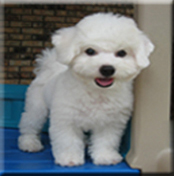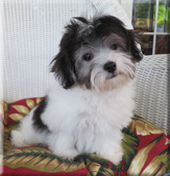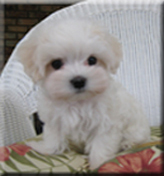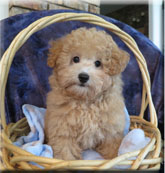
Toy Puppies Presents: 'Puppy-Dog Tales'
Pack Leader
Hi Everyone,
Sorry it’s been so long since last you heard from me. I have fielded several calls lately referring to misbehavior and I’d like to share some of what I spoke about with all of you.
I think many behavior issues stem back to basic “Pack Leadership” and that most people don’t understand the psychology of a dog. Some of the people who buy small dogs don’t expect to have any problem with aggression because indeed the dog is so small. It’s not a Sheppard or Rottweiler. Surprise, a dog, is a dog, is a dog. It turns out that some people do have a problem because they let the dog rule the house. After all it’s so small and cute you can’t discipline it like you would a big dog. They have to bribe or trick the dog to go into the crate and have to be careful when feeding or especially brushing because the dog tries to snap or bite at them. The dog goes after strangers or kids especially if they try to take away a toy or bone.
This is a BIG problem.
Dogs are not furry little people. You cannot explain to them why they should not hurt people. The reason dogs fit so well into our life style is because they are pack animals. In the wild they live in family groups, like we do. There is the alpha male and the alpha female, they are the pack leaders. All the other wild dogs/wolves in the pack are subordinate to the leaders. Females mostly do the hunting, and the young males referred to as “uncles” baby-sit the cubs when the rest of the pack is out hunting. The only male in the pack that mates is the alpha male or pack leader. (That is why neutering is so important) From time to time one of the younger males may challenge him from for leadership. A strong leader will immediately and in no uncertain terms put him in his place. The leader usually bigger and stronger will thrust the opponent to the ground on his back and put his jaws around the challengers’ throat. The challenger will usually submit and the fight will be over. If he does not the leader can kill him and he knows that. A wolf will rarely kill when not necessary.
I tell you this to give you a deeper understanding of your dog’s behavior. Young dogs, like young children, need structure and discipline in their every day life. They are happier and more confident when they know their place in the pack. It is healthy for them to grow up knowing their limits. If you do not exert your authority as pack leader from the very beginning the adolescent at some time may challenge you for leadership. He or she may become aggressive and snap or bite when being asked to do something they don’t want to do. You must respond to this challenge swiftly and severely if you wish to be in charge.
Remember we are dealing with small housedogs. If your puppy growls or tries to bite you grab him by the scruff of the neck hold on tightly, yell very loud and mean NO NO NO BAD DOG. Force him down to the ground if you can and yell some more. You are not trying to hurt him, but rather scare him and make him realize ‘I am in charge here.’ Hold him and look right into his eyes until he stops struggling. Wait another minute before you let him go. He should slink away from you and go sit alone somewhere. Don’t follow him!!! He must sulk for a while. Don’t look for him, or call him or interact with him in any way. He will come to you to apologize if the encounter went as it should have. It may take hours, be strong. The leader never makes up with an underling. It is the dog’s place to come and make up with you. Believe me he still loves you, even more if he knows you are the leader. You must do this every time he/she challenges you or becomes aggressive toward you or anyone else. Remember you are pack leader he should trust that you will handle every situation.
From the time you bring your new puppy home brush him every day. If he doesn’t like it, hold him firmly and do it all the more. Eventually he will know you mean business and will be much calmer. Every time you let him win (stop brushing when he struggles or tries to bite the brush) you are reinforcing the bad behavior, in essence teaching him if he gives you a hard time you will back down. Clean his face, wipe his feet, clean his ears, and cut his nails. If she gives you a hard time hold her still until she stops struggling, then continue what you were doing. It may take a couple of times, but its well worth the effort. You will end up with a loving pet for years to come.
Until next time, remember:
Try to be as wonderful as your dog thinks you are.
Warmest Regards,
Myra















